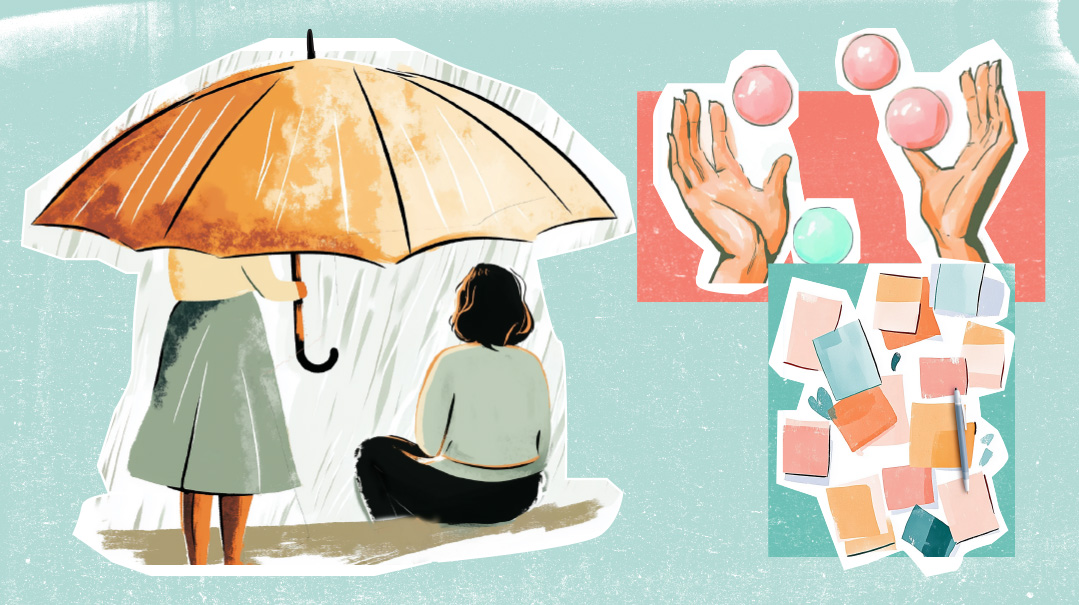Share and Care
| April 29, 2025Does my therapist care about me?

Share and Care
Sarah Rivkah Kohn
One of the questions I get asked over and over again by many clients in therapy is this one: If I don’t pay my therapist, he/she won’t see me, so they essentially care about getting paid, not about me. Right?
Every single relationship, other than that of a parent to a child, is conditional. If a friend gives you time to vent, we reciprocate. If a sibling helps us when we have a baby, we’ll take in her baby or send something when she needs it. And if we invest in a student, the nachas is the payoff. And yes, it’s not even Stephen. There are times when it won’t be balanced.
When are relationships a drain? When there’s no reciprocity.
For most people, that’s how ghosting begins. Or how they drop someone. Or how they feel resentful and kvetch about the interactions.
If every week a client had to worry about how to “do” for their therapist, it would take away the ability to focus on self and there would be limited or no growth.
The brilliance of the payment is that it removes any responsibility for the relationship from the client. If a client feels uncomfortable about something in the therapy room, they’re encouraged to share with their therapist without worrying about how it will make their therapist feel. That’s only possible because this isn’t a two-way relationship.
And that’s why it’s so tricky to do therapy for free (though many therapists have one pro bono slot under intense supervision) because the client often begins to worry, “maybe I’m too much,” and “maybe I shouldn’t burden my therapist with this.”
With payment, we say: Stop worrying. This is what you’re paying for.
Now full disclosure: Do therapists care?
Good therapists do. A lot. I get to witness a lot of collaborative sessions and witness the extent of care. Sometimes it’s in the supervision sessions with, “I’m worried about this client so much. And I’m not sure I can ever give everything he/she needs — there is so much pain.” Sometimes it’s in the ways they will help a client see way beyond the current space. And sometimes, it’s the way they daven for their clients and for the siyata D’Shmaya to build and not tear down.
And the real way they care: by sticking to the therapeutic model and taking that payment so that the client never has to carry any other burden while in the therapy room.
Sarah Rivkah Kohn is the founder and director of Links Family, an organization servicing children and teens who lost a parent.
The Blame Game
by Shoshana Schwartz
A
project at work fails. You wonder, who dropped the ball?
When something goes wrong, most of us instinctively try to figure out who’s at fault. It’s a natural response — one that often happens so quickly we don’t even realize it. But why is finding a culprit so important to us?
Beneath the surface, it’s not just about right and wrong; it’s about emotional safety. For many of us, blame is tied to a deeper question: Do I need to feel bad about this? Growing up, most of us had moments when mistakes were met with frustration, disappointment, or even shame. If we learned that being wrong meant we’d be criticized or made to feel bad, then knowing whether or not we’re at fault became crucial.
When we were younger, admitting fault might have been a way to smooth things over. If a parent or other authority figure was upset, showing guilt or remorse could end the tension. Over time, this pattern can become an automatic response — If I did something wrong, I need to feel bad. When I feel bad enough, maybe things will go back to normal.
And if someone else is at fault, then we don’t have to feel bad. If you forgot to pick up the dry cleaning, I can feel relieved — at least it wasn’t my mistake. In fact, knowing that you’re responsible might even give me a sense of control — I can ask for an apology, expect you to fix things, or simply feel reassured that I’m still “in the right.”
Assigning blame provides certainty, but it also keeps us stuck in old patterns. What if, instead of asking Who’s responsible? we ask How can we make this better? That small shift can help us break free from the blame cycle.
Shoshana Schwartz specializes in overcoming compulsive behaviors, including emotional eating, codependency, and addiction. She’s the founder of The Satisfied Self.
Fun Facts
by Zipora Schuck
Fun facts are seemingly random pieces of information that aren’t well-known, but usually interesting and novel. Our world has an endless supply, like the fact that ketchup was originally used as medicine or that identical twins don’t have the same fingerprints.
Discovering fun facts about people is a great way to get to know someone and relate to their hobbies, interests, likes, dislikes, or characteristics. Ask your children for some fun facts most people don’t know about them. Share information about yourself. Play a game where everyone writes down three fun facts about themselves and then the rest of the family has to guess who it is.
Besides the obvious about hobbies and favorite colors, try some questions like: What is your favorite ice cream flavor? If you could do any job, what would it be? What’s your biggest pet peeve?
Zipora Schuck MA. MS. is a NYS school psychologist and educational consultant for many schools in the NY/NJ area. She works with students, teachers, principals, and parents to help children be successful.
(Originally featured in Family First, Issue 941)
Oops! We could not locate your form.







